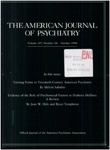Depression and panic attacks: the significance of overlap as reflected in follow-up and family study data
Abstract
Ninety-one patients with panic attacks limited historically to depressive episodes had more severe depressive symptoms and were less likely to recover during a 2-year follow-up than 417 depressed patients who did not have panic attacks. Family study data clearly distinguished another 15 patients with panic disorder and secondary depression; interviewed relatives of panic disorder patients were significantly less likely to have primary depression and significantly more likely to have various anxiety disorders. These data support the hierarchical system by which many of the contemporary diagnostic systems separate panic disorder and major depression.
Access content
To read the fulltext, please use one of the options below to sign in or purchase access.- Personal login
- Institutional Login
- Sign in via OpenAthens
- Register for access
-
Please login/register if you wish to pair your device and check access availability.
Not a subscriber?
PsychiatryOnline subscription options offer access to the DSM-5 library, books, journals, CME, and patient resources. This all-in-one virtual library provides psychiatrists and mental health professionals with key resources for diagnosis, treatment, research, and professional development.
Need more help? PsychiatryOnline Customer Service may be reached by emailing [email protected] or by calling 800-368-5777 (in the U.S.) or 703-907-7322 (outside the U.S.).



